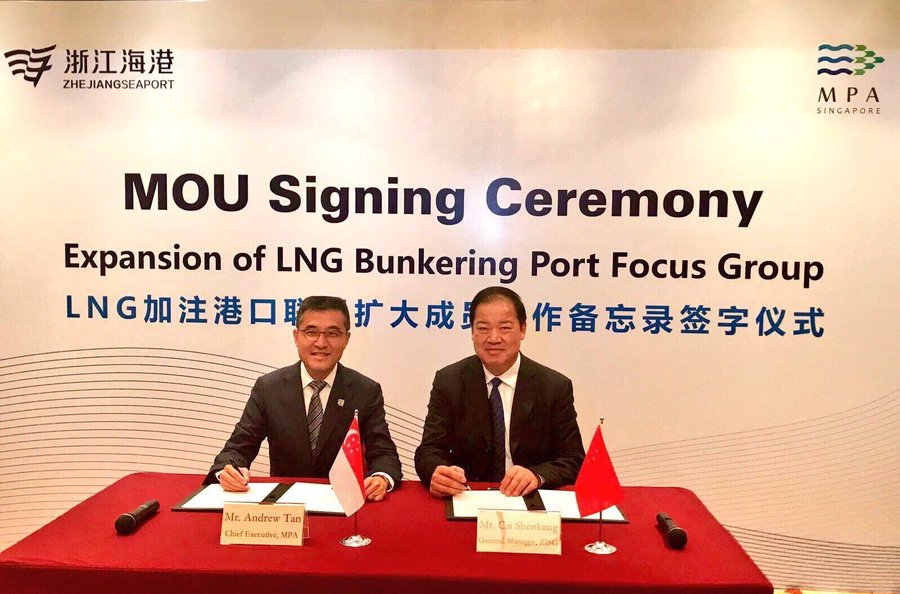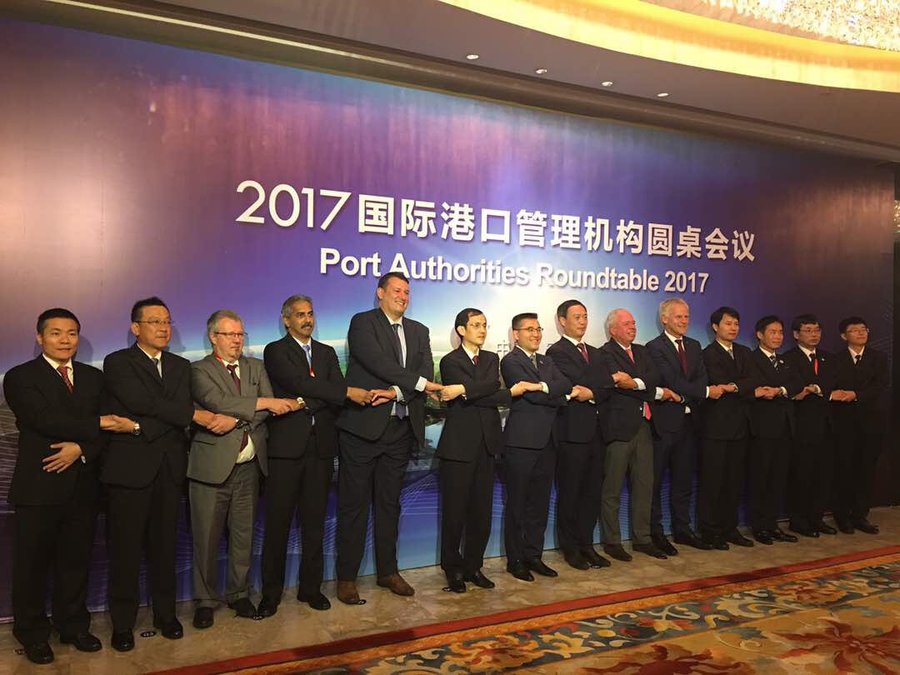LNG Bunkering Port Focus Group Strengthened Through Addition of Port of Ningbo-Zhousan, Port of Marseille Fos and Port of Vancouver
To strengthen the network of Liquefied Natural Gas (LNG) bunker-ready ports and to bolster efforts towards enabling the uptake of LNG as marine fuel, the Port of Ningbo-Zhoushan, Port of Marseille Fos, and Port of Vancouver have joined the Port of Singapore and seven other organisations[1] to participate in an international LNG bunkering port focus group. The inclusion of Port of Ningbo-Zhoushan was formalised today through a signing ceremony held at the sideline of the 3rd Port Authorities’ Roundtable (PAR) organised by the Ningbo Municipal Port Administration Bureau. With this expansion, the network will comprise a total of eleven ports and maritime administrations across Asia, Europe and North America.
LNG Bunkering Port Focus Group
2 The focus group was first formed in 2014 by Maritime and Port Authority of Singapore (MPA), Antwerp Port Authority, Port of Rotterdam and Port of Zeebrugge. In 2016, Asian representation in the LNG bunkering focus group[2] increased with the joining of Ministry of Land, Infrastructure, Transport and Tourism, Japan and Ulsan Port Authority, Republic of Korea. Through the signing of a Memorandum of Understanding (MoU) in Singapore on 5 October 2016, all members of the focus group committed to working together to deepen cooperation and information sharing in relation to LNG bunkering, to develop a network of LNG bunker-ready ports across the East and West and Trans-Pacific trade. The first meeting was held in April 2017 in Yokohama, Japan, where the focus group agreed to focus collaborative efforts on enabling the uptake of LNG as bunkers globally.
3 With growing interest to supply LNG as a marine fuel to meet future demands of the shipping industry, the focus group will be further expanded to include the Port of Ningbo-Zhoushan, Port of Marseille Fos and Port of Vancouver.
3rd Port Authorities’ Roundtable
4 Inaugurated by MPA in 2015, PAR remains a key platform for leaders of port authorities to come together to discuss key issues of mutual interests, exchange best practices and promote closer collaboration. The 3rd PAR is organised by the Ningbo Municipal Port Administration Bureau from 9 – 11 July 2017. This is the first time a Chinese port is organising PAR. The first and second PAR were organised by Singapore and Rotterdam in 2015 and 2016 respectively. PAR2017@Ningbo saw 14 organisations participating in the event including Port and Urban Projects Bureau, Kobe City Government, Port and Harbour Bureau, City of Yokohama, Port of Le Havre and Port of Dalian Authority who participated for the first time.
5 Topics of discussion at PAR2017@Ningbo included cooperation among ports to enhance cybersecurity responses, building sustainable ports for the future as well as integration of port resources to improve efficiency which comes at an opportune time to tackle emerging and on-going challenges faced by the maritime industry. In light of recent cybersecurity attacks, MPA proposed the formation of a “Port Authorities Focal Point Correspondence Network” comprising of PAR members to facilitate early reporting of maritime cybersecurity incidents to allow members to prepare and respond to imminent cyber attacks. This was well received by the participants at PAR2017@Ningbo.
6 Mr Andrew Tan, Chief Executive of MPA said, “The Port Authorities Roundtable, initiated by Singapore in 2015, is a useful high level platform to forge closer collaboration between ports based on like-minded interests. We are pleased that at this meeting, three more ports, including the first Chinese port, will be joining the LNG Bunkering Port Focus Group. We welcome Port of Ningbo-Zhoushan, Port of Marseille Fos and Port of Vancouver to the network and look forward to working with them. We are confident that the inclusion of Port of Ningbo-Zhoushan will add further impetus to enable the uptake of LNG bunkering for the Far East-Europe and Intra-Asia trade routes for the future.”
7 Mr Michio Kikuchi, Director-General, Ports and Harbours Bureau Ministry of Land, Infrastructure and Transport and Tourism, Japan said, "As the world’s largest LNG importing country and also as the world's leading maritime countries, we believe that Japan has a responsibility to promote LNG as a marine fuel in order to accelerate cleaner shipping. It goes without saying that expanding the network of LNG bunker-ready ports network is vital in that regard. We would like to extend a cordial welcome to the Port of Marseille Fos, the Port of Ningbo-Zhoushan and the Port of Vancouver. We are confident that the participation of the Port of Vancouver will bring a significant effect on accelerating cleaner shipping for the Trans-Pacific Trade due to its strategic location."
8 Mr Cai Shenkang, General Manager, Zhejiang Provincial Seaport Investment and Operation Group and Ningbo-Zhoushan Port Group said, “We are very happy to join the LNG port focus group at the invitation of Singapore. Ningbo-Zhoushan Port looks forward to work closely with members of the MOU to promote the use of LNG as a marine fuel for global shipping. Through this group, we believe strongly that we can work together to address safety requirements imposed by international organisations for LNG bunkering and barriers faced by ocean-going vessels looking to use LNG as a fuel in the future.”
9 Mr. Duncan Wilson, VP Corporate Social Responsibility, Vancouver Fraser Port Authority (VFPA) said "We are pleased to be invited by Japan’s Ministry of Land, Infrastructure, Transport and Tourism, Ports and Harbours Bureau, to join this Memorandum of Understanding. Together with other signatories, the Vancouver Fraser Port Authority is committed to working together to deepen cooperation and information sharing in relation to LNG bunkering, and to develop a network of LNG bunker-ready ports.

Mr Andrew Tan, Chief Executive of MPA, and Mr Cai Shenkang, General Manager and Vice-Chairman of Zhejiang Provincial Seaport Group, formalised the inclusion of Ningbo-Zhoushan port as a member of the LNG port focus group at a signing ceremony this afternoon. This is the first Chinese port that has joined the focus group and will bolster ongoing efforts to enable use of LNG as marine fuel for Far East-Europe trade.

PAR2017@Ningbo - Promoting closer collaboration among ports to share best practices and information exchange.
[1] Antwerp Port Authority, Port of Rotterdam, Port of Zeebrugge, Port of Jacksonville, Norwegian Maritime Authority, Ministry of Land, Infrastructure, Transport and Tourism, Japan and Ulsan Port Authority, Republic of Korea.
[2] The focus group which initially comprises the Maritime Port Authority of Singapore (MPA), Port of Rotterdam, Antwerp Port Authority and Port of Zeebrugge, first came together in 2014 to discuss harmonising LNG bunkering standards and procedures for international shipping. In early 2016, the Norwegian Maritime Authority and Jacksonville Chamber (representing Port of Jacksonville) joined the group. A set of harmonised LNG bunkering standards developed by these six members was launched in October 2016 to provide a guide to ports which were seeking to be LNG bunker-ready.
